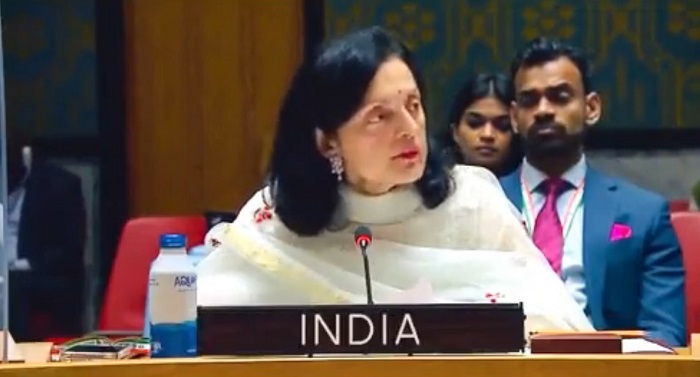

Ruchira Kamboj, India's Permanent Representative to the United Nations (Video grab courtesy: India at UN)
India on Thursday abstained from a vote at the United Nations General Assembly (UNGA) on a resolution on Ukraine citing its “inherent limitations” in reaching the desired goal of “securing lasting peace” in the region.
The resolution ‘Principles of the Charter of the United Nations underlying a comprehensive, just and lasting peace in Ukraine’ — was adopted by a recorded vote of 141 in favour to 7 against (Belarus, Democratic People’s Republic of Korea, Eritrea, Mali, Nicaragua, Russian Federation and Syria), with 32 abstentions, including India, China and South Africa.
The UNGA resolution, voting for which took place on the eve of the first anniversary of the Russia-Ukraine conflict, underscored the need to urgently reach peace and demanded that Moscow withdraw its military forces and emphasised the need to ensure accountability for crimes committed on Ukraine’s territory.
As India abstained, Permanent Representative to the UN, Ruchira Kamboj raised “a few pertinent questions”, in the explanation of the vote.
“Are we anywhere near a possible solution acceptable to both sides? Can any process that does not involve either of the two sides, ever lead to a credible and meaningful solution? Has the UN system, and particularly its principal organ, the UN Security Council, based on a 1945-world construct, not been rendered ineffective to address contemporary challenges to global peace and security?” asked Ambassador Kamboj.
“Mr. President, India remains steadfastly committed to multilateralism and upholds the principles of the UN Charter. We will always call for dialogue and diplomacy as the ONLY viable way out. While we take note of the stated objective of today’s Resolution, given its inherent limitations in reaching our desired goal of securing lasting peace, we are constrained to ABSTAIN,” she added.
India maintained that it continues to remain concerned over the situation in Ukraine as the conflict has resulted in the loss of countless lives and misery, particularly for women, children, and the elderly, with millions becoming homeless and forced to seek shelter in neighbouring countries. Reports of attacks on civilians and civilian infrastructure are also deeply worrying.
“We have consistently advocated that no solution can ever be arrived at the cost of human lives. In this context, our Prime Minister’s statement that this cannot be an era of war bears reiteration. Escalation of hostilities and violence is in no one’s interest, instead an urgent return to the path of dialogue and diplomacy is the way forward,” said Kamboj.
The Indian Ambassador reiterated that international principles and jurisprudence vest responsibility on parties to the conflict to ensure that civilians and civilian infrastructure are not targeted in situations of armed conflicts.
“The global order that we all subscribe to, is based on International Law, the UN Charter and respect for the territorial integrity and sovereignty of all states. These principles must be upheld without any exception,” she said.
Kamboj also mentioned that it is unfortunate that as the trajectory of the Ukrainian conflict unfolds, the entire Global South has suffered its unintended consequences, maintaining that it is critical that the voice of the global south be heard and their legitimate concerns be duly addressed.
“India’s approach to the Ukraine conflict will continue to be people-centric. We are providing both humanitarian assistance to Ukraine and economic support to some of our neighbours in the Global South under economic distress, even as they stare at the escalating costs of food, of fuel, and of fertilizers – which has been a consequential fall out of the ongoing conflict,” said the Indian Ambassador.
India said that while the overall objective of Resolution seeking a comprehensive, just and lasting peace in line with the UN Charter is understandable, reports from the ground portray a complex scenario, with the conflict intensifying on several fronts.
India decisively asserted its military superiority over Pakistan during this month's brief but intense conflict,…
Trade associations and local business groups in Pakistan-occupied Gilgit-Baltistan (PoGB) launched an indefinite protest on…
A human chain and protest march was organized by various organizations in front of the…
The United States on Saturday announced the expansion of its security partnerships with India through…
Highlighting the use of indigenous platforms during Operation Sindoor, Chief of Defence Staff (CDS) General…
Congress MP Shashi Tharoor on Friday (local time) said that Colombia will issue a statement…